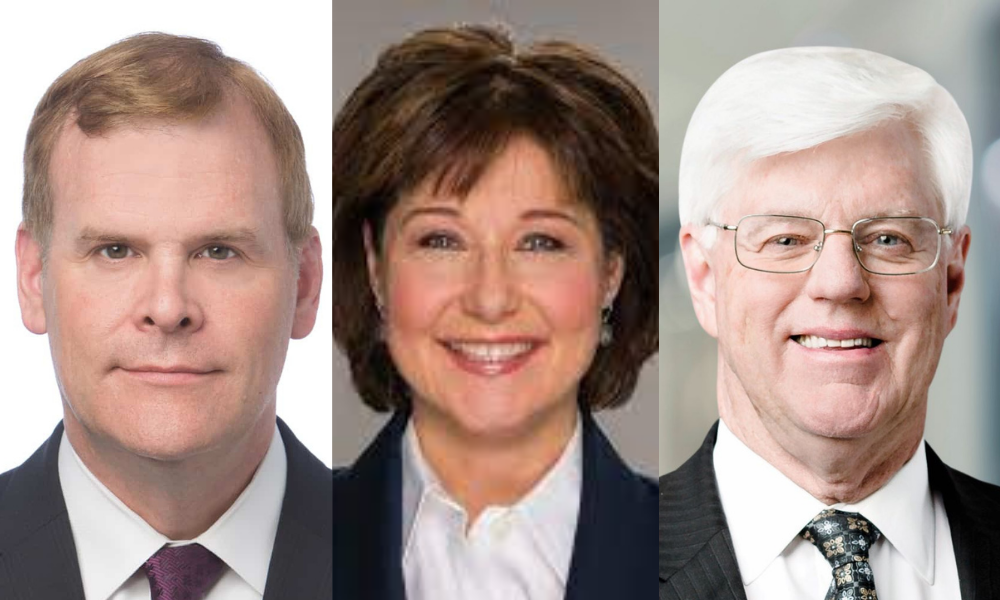Former politicians, now senior advisers at law firm, weigh in on what's next

A re-elected minority Liberal government may at first look like nothing much has changed — despite costing taxpayers $600 million. But former politicians, now policy advisers at Bennett Jones LLP, told a webinar they worry that even less attention will be paid to fiscal responsibility and ensuring that our debt won’t be left for future generations to pay.
John Baird — who served as minister of foreign affairs from 2011 to 2015 in the cabinet of Prime Minister Stephen Harper — said that given four of the federal parties are left of centre, increasing revenue through higher corporate taxes and more taxes on areas of capital gains and stock options will likely be on the table.
“There is a degree of class warfare I have not seen before,” Baird said, adding that the attitude of “amen to higher taxes” and “eat the rich” are part of the left of centre zeitgeist. The problem with that attitude, he said, is that this could have the effect of slowing economic growth and investment in Canada.
John Manley, deputy prime minister of Canada from 2002 to 2003 during the Liberal government of Jean Chretien, added that many progressives have, somewhat unfairly, railed against financial institutions.
His own view, as a former president and CEO of the Business Council of Canada and current chairman of the Canadian Imperial Bank of Commerce, is that it was financial institutions in Canada who “got us through the Great Recession, and then played a role with government through the current pandemic” by helping those hurt get through financially challenging times.
The banks demonstrated “resilience and scale that we should be applauding,” he said, not imposing a higher tax burden on them.
Christy Clark — former Liberal premier of British Columbia — told the 1,000 or so listening to the seminar that she is particularly concerned about the energy sector in Canada if the next government is going to push too far too quickly for increased carbon taxes and regulation.
There is a direct connection between the energy and resources sectors’ success and the ability for Canadian governments to pay for essential things, such as healthcare, that “bind us together,” Clark said. She added that she is very concerned that with the minority Liberals relying on the NDP or the Bloc Quebecois to prop it up, “we could end up with a very anti-energy” government.
While reducing dependence on carbon fuels is important, Manley said it is also important to note that the demand for fossil fuels is still there and “will be met one way or the other.” If not Canada, with fossil fuels mined more cleanly than other parts of the world, it will be suppliers of oil that are not as environmentally conscious.
He added that while he “doesn’t know what is going on in [Prime Minister] Justin Trudeau’s head,” there is a good likelihood that he won’t run in the next election. If that is the case, Trudeau will want to leave a legacy regarding climate change, which will likely mean a commitment to higher carbon taxes and tougher regulations.
Manley said his hope is that Trudeau leaves politics “with Canada in a better fiscal place,” but “past record doesn’t show that will happen.” The webinar panellists noted the government is now borrowing at a rate of $440 million a day, a level of debt that could crush future generations of Canadians.
The panellists also pointed out that minority governments at the federal level will become more common, given demographics and the “first past the post” method of declaring winners of Canada’s 338 ridings.
Baird pointed out the Bloc’s strong presence as a Quebec-only party by itself makes it difficult for any one party to form a majority. Add the left-of-centre nature of the parties that can hold the balance of power in a Liberal minority government — the NDP, the Bloc, and the Green Party — and the Liberals will always be pulled to the left.
While Clark suggested that the Conservatives might increase their chances by being a party that moves closer to the centre, fiscally conservative but more progressive on social issues, Baird suggested that the Conservatives might be better off staying to the right of centre. However, he acknowledged that the rise of the People’s Party of Canada, with stronger right-wing views, will be a challenge to the CPC.
Manley noted that while the Conservative Party of Canada has a “very solid base” — rarely going below 30 per cent, "its ceiling is too low,” and needs to win more in urban areas, such as Toronto and the surrounding region.
He added that CPC leader Erin O’Toole made a good effort to attract voters in the centre, but some of what he did — such as policies on climate change, was too little too late. As well, the issues surrounding assault weapons — which came across as loosening current regulations — “came at an awkward time" and prompted people to stop and pause to wonder “what have we really got there” in Erin O’Toole.
As for Green Party Annamie Paul, Baird noted, “she is probably dusting off her resume” given the collapse in vote for that party this election. And Jagmeet Singh may be a “nice guy," Baird said, "but he is an ineffectual leader” and the NDP may likely be considering its future with him as leader.










